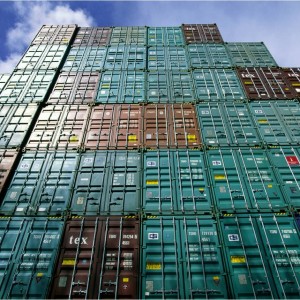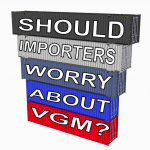Much Ado About VGM

VGM cargo containers
Sigh no more, ladies, sigh no more,
…
And be you blithe and bonny,
Converting all your sounds of woe
Into Hey, nonny nonny.
–William Shakespeare’s Much Ado About Nothing
The new verified gross mass (VGM) rule went into effect on Friday. Despite concerns around the globe about possible interruptions to cargo flow at ports, implementation has gone smoothly so far.
Reports around the world show few to no disruptions at ports due to the new rule requiring shippers to provide the weights of loaded shipping containers in order to get cargo containers loaded onto ships.
We won’t quite sing, “Hey, nonny nonny” yet (if that’s even a thing people actually do).
Implementation of the new rule has only just begun, so it is too soon to say for certain the VGM rule will not cause or contribute to port congestion at port terminals around the world, but all signs point to a smooth transition to the new rule.
While the VGM rule implementation did not carry the same mass panic of Y2K, or the Year 2000 Problem, at the turn of the millennium, one can’t help but see similarity between the building worry each non-disaster produced, which resulted in much ado about nothing.
There is one issue, which shippers are not happy about, being created by the new VGM rule:
Fees.
Just like people found ways to profit from Y2K with companies and consultants charging other companies money to protect them from the Millennium Bug, some carriers, port terminals, and freight forwarders are charging fees for handling the new VGM paperwork.
Shippers feel that in these situations, companies are taking advantage of the VGM rule to unjustly increase the profit they make off of shippers.
The Global Shippers’ Forum (GSF) brought some of these VGM associated fees to life, calling them unacceptable, in a press release:
Regrettably GSF members, mainly in Asia and Africa, report that some carriers and other ‘service providers’ appear to be exploiting the introduction of the new VGM rules by imposing exorbitant and unjustified charges for questionable and unspecified “administration fees” and other “services”.
The GSF is calling for those charges to be withdrawn immediately. The GSF is currently examining the following examples provided by members and will be taking them up with the service providers:
- China: The global forwarding company Kuhne and Nagel is charging a VGM administration fee for all K&N shipments booked in China – specifically USD 12.75 for full containers if shippers are using the K&N electronic VGM system, or USD 25.00 for manual data entry. Similarly, OOCL Logistics have announced that they will be charging a Verified Gross Mass (VGM) Administration Fee of USD 15 per document for all exports from China.
- Nigeria: The logistics and shipping firm Grimaldi Agency Nigeria have notified customers that they will weigh containers on departure at a cost of N20,000 per 20 foot container and N40,000 per 40 foot.
- Sri Lanka: GSF members have advised that shipping lines are considering charging shippers USD 25 for submitting the VGM, and, in cases where the final weight differs from the booked weight, an additional charge of USD 50 for amending the VGM.
- UK & Ireland: The ports group DP World, which owns both Southampton and London Gateway ports, impose a £1.00 charge for VGMs provided prior to arrival (rising to £3.00 after box arrival but before 24 hour cut off).
Chris Welsh, GSF Secretary-General, said: “Shippers worldwide support the safety goals of the container weighing requirements and are committed to fulfilling their regulatory requirements, but this should not be used by supply chain partners as an excuse to impose unjustified fees.
A nice article from the Journal of Commerce highlights shippers’ frustrations on the issue of VGM-related fees, but also brings balance by sharing a defense of the fees from one such company charging them:
Forwarders, such as DB Schenker, have defended the new fees, arguing that the keying in of VGM data requires extra effort and time. The forwarder added there was also a considerable, and as yet unexplored, financial risk and legal angle to the SOLAS rule.
“It starts with the cost of simple exception management in cases of VGM discrepancies or the inevitable late submission of VGMs, such as making sure containers don’t roll, amending manifests, customs declarations,” Joerg Hopp, DB Schenker director and head of Ocean Freight for North and Central China, told JOC.com earlier this week. “And it ends with the VGM further firming up the chain of legal responsibility and custody in case of accidents involving containers. After all, NVOCCs (non-vessel-operating common carriers), such as DB Schenker, are legally acting as the shipper of record and as such have to provide a correct VGM to the carriers.”
While Mr. Hopp’s argument seems reasonable, I am not sold on the idea that shippers should be charged extra fees when it comes to VGM, especially if they do all the work of providing the weight of their loaded shipping containers themselves.
Freight forwarders are hired to make sure all the intricacies, including paperwork, of international shipping are handled for shippers. VGM paperwork does not seem to be such a burden that freight forwarders would need to charge extra for it.
Here at Universal Cargo, we’ll be monitoring the VGM situation as the transition to the new rule continues. If VGM-related disruptions do start occurring, we’ll keep you up to date. We’ll also be watching to see who wins this debate over VGM-related charges.




